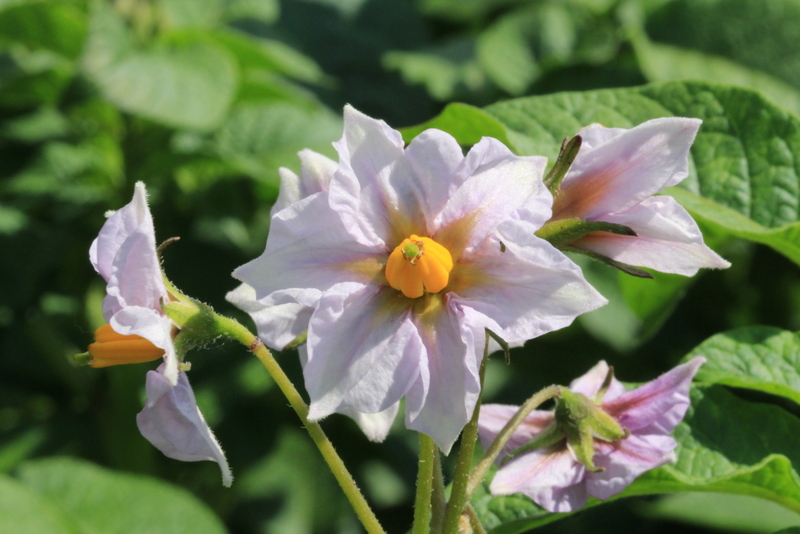Potato Extension
Late Blight Found in MN and MB
Late blight has been found in multiple farms in MN and also found in MB. The genotype has been identified as US23. Growers should watch their crop at harvest and after harvest for the presence of late blight tuber infection. Post-harvest application of Phostrol or a similar product can reduce spread of late blight in storage.
Aphid Alert for September 14
Aphids are rapidly disappearing (not surprising) and more trap locations are shutting down for the season. But we've been calculating the Risk Index for locations still reporting.
UNECE Guide to Seed Potato Field Inspection: Recommend Practices
To harvest a plentiful and healthy yield of seed potatoes for trading internationally, producers have first to plant seed potatoes of the highest quality. The United Nations Economic Commission for Europe (UNECE) has drawn up an international reference quality Standard for Seed Potatoes (UNECE Standard S-1) to help producers do exactly this. The UNECE Guide to Seed Potato Field Inspection has been developed to aid countries in the application of the Standard. The Guide is recommended for use at the discretion of the Designated Authority (DA). The Standard sets common terminology and minimum requirements for certifying high-quality seed potatoes for international trade. It covers: • Varietal identity and purity • Genealogy and traceability • Diseases and pests affecting commercial quality or yield • External tuber quality and physiology • Sizing and labelling.
Optimizing Shank Injection Fumigation Using Metam Sodium by Neil Gudmestad
The soil fumigant metam sodium continues to play an important role in the management of soil borne pests of potato such as Verticillium dahliae, the primary cause of early dying, and the root lesion nematode, Pratylenchus penetrans. Recent label changes resulting from the re-registration of metam sodium by the EPA have made the application of the fumigant through water applications very difficult due to the requirement of large buffer zones to reduce human and animal exposure to the chemical. As a result, there has been a dramatic increase in the application of metam sodium via shank injection. This method of application is not as efficacious as water applications of metam sodium. This presentation will discuss the most recent research conducted at North Dakota State University directed at improving the efficacy of shank injection metam sodium.
My Potatoes Turned Green: Now What?
Potato tubers turn green when they are exposed to sunlight during growth or storage. The green comes from the pigment chlorophyll. Potato tubers exposed to light will become green naturally as the plant seeks to harvest the light. Solanine is a toxic substance that is produced naturally in potatoes and other plants to aid in resistance of insects and animals. Solanine is present in all parts of the potato plant, including the sprouts, roots, leaves, flowers and fruits. Solanine has a bitter taste and can cause stomach symptoms such as vomiting and diarrhea if you eat enough of it. If ingested in large amounts, it can cause illness or even death in extreme cases. Because of the bitter taste, most people do not eat enough to get sick. In addition, consumers always should avoid consuming sprouts.
Aphid Alert, September 1 2015
It looks like the cooler weather has begun to decrease aphid numbers. We are reporting two weeks worth of data for the Hatton and Tappen sites, and in each case there is a significant reduction in total vectors and PVY risk. Green peach numbers are down and soybean aphids have dropped dramatically in all locations except Ada. PVY-Vector Risk Index values reflect the weekly trap trap catch. Cumulative season PVY-VRI values are nearing those of last year in some locations. For the whole story and detailed catch information, as well as the PVY-VRI maps check out: aphidalert.blogspot.com
Blightline August 31
Congratulations to all those in the potato industry in ND, MN and MB. No late blight has been reported or confirmed in our region this entire growing season. Growers should continue to scout fields for late blight, concentrating in areas that are wet longer such as low areas, near shelterbelts or around pivot wells. Morning fog and dew are beginning to appear, and these can contribute to free moisture need for late blight infection.
Bones are Bad in Potato Production
The goal of potato growers is to produce a high-yielding, high-quality crop that is safe for consumption. Animal bones, a foreign material, are a food safety risk, and fields that have bones in the soil are not suitable for potato production.
Pictures from Field Day
The NPPGA Potato Field Day was an awesome day! Talks were great, fields looked amazing, and the meals were super. Thanks to Hoverson Farms, Oberg Farms, NPPGA potato associates, NPPGA, NDSU Extension Service, and all the corporate sponsors.
NPPGA Potato Field Day Schedule
The NPPGA Potato Field Day on August 20th will have a variety of speakers and presentations. They include Drs. Andy Robinson, Neil Gudmestad, Susie Thompson, Guiping Yan, Ian MacRae, Gary Secor, Darrin Haagenson, Harlene Hattermna-Valenti, and Tom Michaels. Topics include agronomy, breeding, entomology, nematodes, plant pathology, and weed science.
Document Actions





